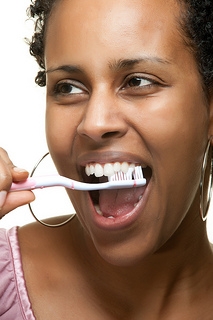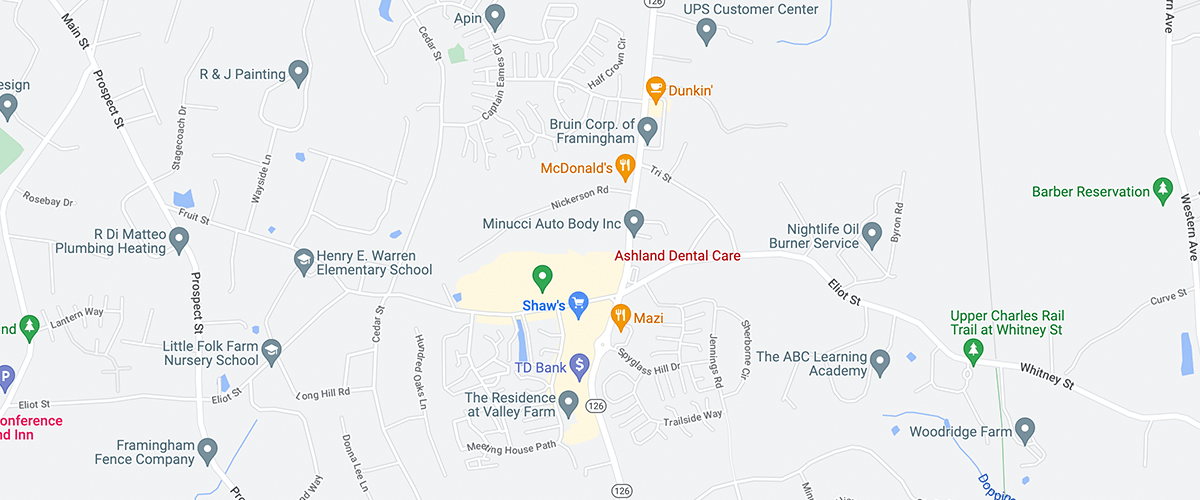
Since gum disease is one of the most common adult diseases, it’s no wonder our doctor and our team stress the importance of prevention. Effective brushing and flossing, regular dental appointments for exams and cleanings, and a prompt visit to our Ashland dental office if you notice symptoms of gingivitis (early gum disease) are all important steps to prevent more serious periodontal disease from developing.
One more step you can add to keep your gums their healthiest? Add some gum-healthy foods to your shopping cart! To see how your diet can help prevent gum disease, let’s look at what can cause gum disease.
When plaque builds up between teeth and gums, the bacteria found in plaque cause our gum tissue to become inflamed, swollen, and painful. Left untreated, the gums pull away from the teeth, leaving pockets where bacteria collect and can cause infection.
Prolonged inflammation can lead to the destruction of gum tissue and the connective tissues which anchor our teeth to the alveolar bone in the jaw. Bone loss and even tooth loss can result from untreated gum disease.
Fortunately for us, there are foods that fight inflammation, help with healing, and strengthen and support gum tissue before problems develop. Let’s take a look at some of the valuable gum-healthy nutrients you can add to your diet with some tasty additions to your shopping list:
This vitamin is essential for the health and healing of mucous membranes, including both our gums and the soft membranes in our mouths. Vitamin A is found in animal products such as dairy foods, meat, and liver, or formed in the body from beta-carotenes, found in plant foods such as carrots, peppers, pumpkin, squash, and sweet potatoes.
Vitamin C is one of the so-called “essential nutrients.” These are nutrients that are necessary for our bodies to function properly, and which can only be supplied in our diets. Vitamin C is needed to help our bodies produce collagen, the substance that provides support and structure to our tissues. It also helps us repair tissue, and is a powerful antioxidant. One of the obvious signs that your diet doesn’t contain enough vitamin C is inflamed and bleeding gums.
When we think vitamin C, we instantly picture citrus fruits. Oranges, lemons, limes, grapefruit, and all their cousins are a wonderful source of vitamin C. Looking for a little more variety? You’re in luck! Fruit fans can load up on strawberries, kiwi fruit, mangos, and papayas. Love your veggies? Red peppers, kale, cauliflower, Brussels sprouts, and broccoli contain more vitamin C per serving than a medium orange.
Vitamin D, of course, is essential for dental health because it helps us absorb the calcium that keep teeth (and bones) strong. And there’s more! It helps the body fight infection and reduce inflammation, and studies have suggested a link between vitamin D and better gum health.
Sunlight exposure leads our bodies to produce vitamin D naturally, but it is available in foods as well. Fatty fish, such as salmon, tuna, and herring, are a rich source of the vitamin, as are cod liver oil and egg yolks. It’s also available in foods fortified with vitamin D, such as cow’s milk, soy milk, orange juice, and even many cereals. And while you’re getting the benefit of vitamin D from dairy, you’re also enjoying the proteins they contain, one of which helps neutralize acids in the mouth that can irritate gums. Bonus!
Iron deficiency can lead to a common form of anemia, where your body isn’t creating enough red blood cells to deliver the oxygen your tissues need. (In fact, one of the most noticeable symptoms of anemia is pale gums.) This condition can cause a number of problems, including an immune system that doesn’t work as well as it should. A strong immune system helps us fight infection, including gum disease and other oral infections.
A diet rich in iron can help prevent anemia. We absorb the most iron from foods such as meat, eggs, and fish, but iron is also present in beans, lentils, leafy greens, whole grains, nuts, and prunes if you’re looking for flavorful vegetarian options.
Research has shown a possible relationship between getting the recommended dietary amounts of omega-3s and a lower occurrence of periodontitis. In other studies, omega-3s have shown promise in reducing the periodontal inflammation that can lead to severe gum disease.
Our bodies can’t produce omega-3 fatty acids on their own, but fatty fish such as salmon, tuna, herring, and sardines, a variety of high-fat seeds and nuts, and plant oils contain several different types of omega-3 fatty acids. Some foods are fortified with omega-3s, or your doctor might recommend fish oil (and algae oil for vegetarians) as a supplement.
Speaking of supplements, why not just add vitamin, mineral, and other nutritional supplements to our daily diet? Believe it or not, there can actually be too much of a good thing. Body chemistry requires balance, so talk to your doctor about whether or not supplements are necessary in your particular diet, and just what kinds and how much to take.
Whew! That’s a lot to think about for one shopping cart, but that’s just a small portion of the many foods—and the many vitamins and minerals—you can add to your menu to support oral health in a tasty, effective, and positive way.
After all, when we think about the “do’s and don’ts” of a dental-healthy diet, it’s all too often a collection of “don’ts.” Don’t eat a lot of sugar. Avoid acidic foods and beverages. Cut down on refined carbs. And all of those suggestions are important, because the early stages of gingivitis are often easy to miss.
But let’s not forget the things we can actually do to be proactive with our gum health. Besides good dental hygiene and regular checkups at our Ashland office, eating a well-balanced diet helps keep your gums their healthiest—and while we can do a lot to treat gum disease, the very best treatment of all is prevention!




